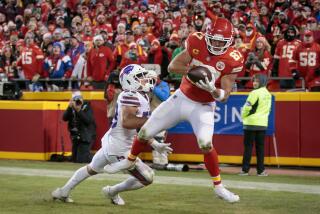COMMENTARY : Now Is Time to Take Some of the Kick Out of Football
- Share via
Long ago, on the first day that football was played in the United States, running with the ball was forbidden. So was passing. In the beginning, the game that has always been called football in this country was actually soccer.
The truth is that in the last 100 years or so, football has evolved from soccer.
American athletes, dissatisfied with almost everything about the game except its European name--football--deliberately transformed soccer into American football the hard way: by making rule changes. More than 900 rule changes.
In early experimenting, touchdowns, for example, were worth only one or two points, and field goals as much as four to six points.
Accordingly, those proposing modifications today are hardly radicalizing the game.
And in my view, the NFL needs a rule that would compel the coaches and players to plan more touchdown drives and fewer field-goal drives.
It isn’t kicking that appeals to football fans. It is skilled passing, superior ballcarrying and fierce defense.
With rule changes, those components could be encouraged in various ways, such as:
--The NFL could direct that no game can end on a field goal.
--After a late go-ahead field goal, regardless of time left, the rules could authorize the opponent to complete another possession.
--In overtime, after a field goal, the opponent could be authorized to complete another possession.
Such modifications wouldn’t abolish kickers, just warn the coaches to aim for goal lines instead of goal posts.
Before the details of the proposal are mentioned, here are some considerations:
First, NFL games should be won decisively.
At present in pro football, you can win by loafing along, taking four or five minutes off the clock, and kicking a short, last-second field goal.
A second NFL problem is that football is the only American game decided by players from another sport.
In basketball, the Lakers, when two points down in the last two seconds, don’t call time out and bring in a soccer player to kick a three-point field goal.
In baseball, the Dodgers don’t ask soccer players to kick home runs.
The thought is ridiculous--but no more so than the reality in football.
Although the essence of American football is running and passing, America’s most skilled football players are replaced during field-goal attempts today by kickers, who lack NFL credentials as runners, passers, receivers, blockers or tacklers.
By contrast, the essence of baseball is hitting and pitching. And hitters and pitchers are always in there.
As of the 1990s, the field-goal attempt has become wholly extraneous to what the NFL game is essentially about.
THE ALTERNATIVES
The missing link in the NFL lately has been a leaguewide discussion of what to do about the rising influence of three-point plays.
In the old one-platoon years, a kicker was always a football player. He had to be. He was a quarterback first, or an offensive tackle, who seldom had time to polish a secondary skill.
Later in the century, free substitution brought in specialist kickers who have become increasingly reliable from 45 or 50 yards out--thus inviting the coaches and quarterbacks to play for field goals instead of touchdowns.
It is their mind-set that hurts pro football.
By studying the circumstances, the NFL’s owners and general managers might come up with a rule change that would help.
This proposal is one of many possibilities. Some others:
--It could be mandatory for kickers to be football players again. To qualify as kickers, they could be required to average one play out of three or four as linemen or backs. The rule could be enforced if the will were there to enforce it.
--Or it could be mandated that a late field goal can only tie the game, not win it. A last-second field goal in a 21-20 game would be worth only one point, giving each side a chance to win it playing football in overtime.
--Or, at the least, the NFL could work on its worst injustice, the 50-yard field goal on an artificial field that follows an overtime kickoff and a quick first down or two.
--Or the league could rule that a late field goal can only be kicked from, say, the 25-yard line. That would eliminate the last-minute 47-, 50- or 53-yard kicks that so suddenly undo the contributions of so many football players.
At the Super Bowl last month, Scott Norwood’s last-minute, 47-yard kick for the Buffalo Bills, if successful, would have undone the work of the New York Giants’ defense--the NFL’s best in five years--not to mention the contributions of a fine new quarterback, Jeff Hostetler.
On the other hand, Norwood’s miss ruined the season for the outstanding football players on the Buffalo team, quarterback Jim Kelly and the others.
Considerable compassion for Norwood was expressed afterward by fans who sought to console him. Their compassion might better have been reserved for Buffalo’s football players, who were closing in on a victory that was lost on a miss by their kicker.
Super Bowl XXV was a clear example of the NFL’s increasing overemphasis on the field goal as a weapon of decision.
The Giants were in Tampa Stadium with the defensive team of the year and a surprisingly effective new quarterback.
The Bills were there with the offensive team of the year, a team that played well enough to win the game with its new-style, shotgun-formation, no-huddle attack.
Yet, in the end, neither the great old defense nor the stylish new offense was allowed to decide it.
Some of the NFL’s best players had to get off the field while a kicker took a 50-50 shot at the goal posts. Heads you win, tails you lose.
There has to be a better way.
THE SUGGESTION
Pro football is a game that needs a one-point play to aid tiebreaking. It also needs two objectives for the offensive teams--a three-point play as well as a six-point play--and in the NFL, there’s little support for change in the present machinery.
Kicking is here to stay.
The kicking rules just need some fine-tuning.
For instance, NFL games, which can’t end on a defensive penalty, shouldn’t end on a field goal, either. That gives the three-point play too much weight.
The following are details of the proposal expressed earlier:
--When Team A takes the lead on a late field goal, the game shall proceed, regardless of time left, to give Team B an opportunity to receive the kickoff and complete a possession.
--When Team A takes the lead on an overtime field goal, Team B shall get an opportunity to receive a kickoff and complete a possession.
In one instance, the game might last somewhat longer than 60 minutes before Team B completes the possession. In the overtime instance, conceivably, it could last a while longer than 15 minutes.
In either case, Team B could lose its bonus possession opportunity on a muffed kickoff, interception, fumble, failed fourth-down play or failed field-goal play.
In theory, one go-ahead field goal could follow another, building suspense and pressure, until one team misses or scores a touchdown. No game would be able to end on a field goal.
Team A, which starts it all with a late kick, will know that if it has dawdled into position to get three instead of six points, Team B will soon have a chance to work its way down the field unconcerned about the clock.
The idea is that bold play should be rewarded, not field-position play. Coaches and quarterbacks should be inspired to think touchdown, not field goal. You should have to win decisively.
Who has a better idea?
More to Read
Go beyond the scoreboard
Get the latest on L.A.'s teams in the daily Sports Report newsletter.
You may occasionally receive promotional content from the Los Angeles Times.










